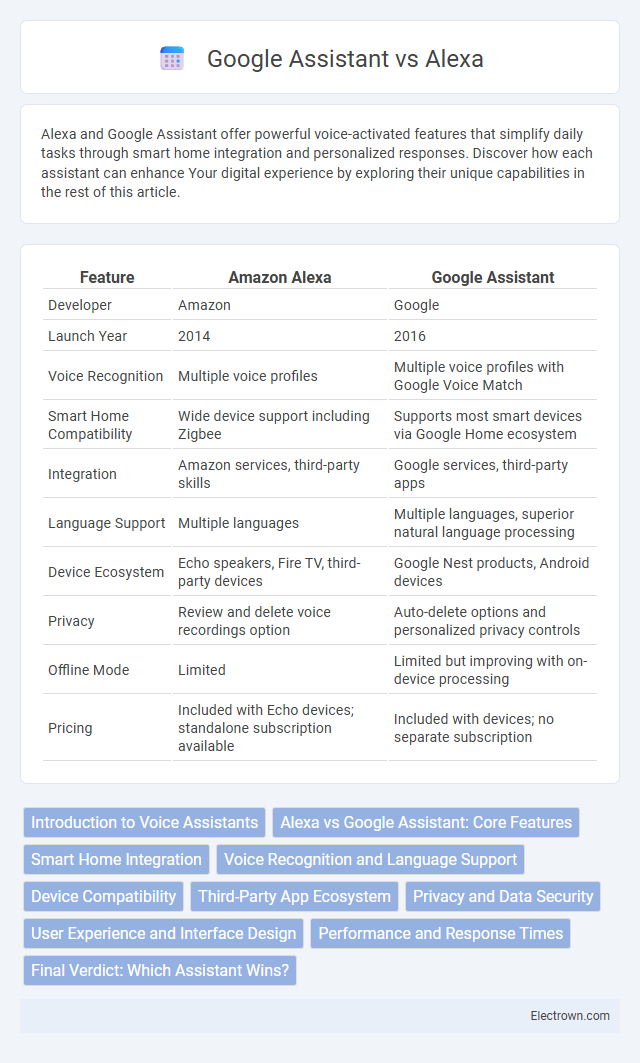Alexa and Google Assistant offer powerful voice-activated features that simplify daily tasks through smart home integration and personalized responses. Discover how each assistant can enhance Your digital experience by exploring their unique capabilities in the rest of this article.
Table of Comparison
| Feature | Amazon Alexa | Google Assistant |
|---|---|---|
| Developer | Amazon | |
| Launch Year | 2014 | 2016 |
| Voice Recognition | Multiple voice profiles | Multiple voice profiles with Google Voice Match |
| Smart Home Compatibility | Wide device support including Zigbee | Supports most smart devices via Google Home ecosystem |
| Integration | Amazon services, third-party skills | Google services, third-party apps |
| Language Support | Multiple languages | Multiple languages, superior natural language processing |
| Device Ecosystem | Echo speakers, Fire TV, third-party devices | Google Nest products, Android devices |
| Privacy | Review and delete voice recordings option | Auto-delete options and personalized privacy controls |
| Offline Mode | Limited | Limited but improving with on-device processing |
| Pricing | Included with Echo devices; standalone subscription available | Included with devices; no separate subscription |
Introduction to Voice Assistants
Amazon Alexa and Google Assistant are two leading voice assistants designed to streamline daily tasks through natural language processing and AI technologies. Alexa, integrated into Amazon Echo devices, offers extensive smart home compatibility and a vast array of third-party skills, while Google Assistant excels in contextual understanding and seamless integration with Google services like Search, Maps, and Calendar. Both voice assistants leverage advanced machine learning algorithms to interpret user commands and provide personalized responses, making them essential tools for hands-free information retrieval and smart device control.
Alexa vs Google Assistant: Core Features
Alexa offers extensive smart home compatibility and thousands of third-party skills, excelling in customizable routines and voice-controlled devices. Google Assistant provides powerful natural language processing and superior integration with Google services like Calendar, Maps, and Search, enhancing productivity and contextual responses. Your choice depends on whether you prioritize smart home versatility with Alexa or seamless Google ecosystem connectivity with Google Assistant.
Smart Home Integration
Alexa supports a wide array of smart home devices, offering compatibility with over 100,000 Alexa-enabled devices from brands like Philips Hue, Ring, and Ecobee. Google Assistant integrates seamlessly with Google's ecosystem, including Nest products and over 10,000 smart home devices, providing robust control through voice commands. Both assistants enable routines and automation, but Alexa's broader third-party device compatibility edges ahead in versatility for smart home integration.
Voice Recognition and Language Support
Alexa and Google Assistant both offer advanced voice recognition capabilities, but Google Assistant typically excels with more accurate natural language processing across diverse accents and dialects. In terms of language support, Google Assistant supports over 30 languages and multilingual interactions, whereas Alexa supports fewer languages but continues expanding its range. Your choice may depend on whether you prioritize broader language compatibility or integration with specific smart home ecosystems.
Device Compatibility
Google Assistant supports a broader range of devices, including Android phones, smart speakers like Nest Audio, smart displays, smart TVs, and various third-party smart home products. Alexa offers extensive compatibility with over 100,000 smart home devices from hundreds of brands, plus Amazon Echo smart speakers and Fire TV devices. Both assistants integrate with many IoT devices, but Google Assistant's native presence on Android phones gives it a compatibility advantage in mobile ecosystems.
Third-Party App Ecosystem
Alexa offers a vast third-party app ecosystem through its Alexa Skills, boasting over 100,000 skills that cater to smart home control, entertainment, and productivity. Google Assistant leverages the Google Actions platform, supporting thousands of third-party apps with deep integration into Google services such as Calendar and Maps for seamless user experiences. Alexa's extensive skill marketplace provides greater customization options, while Google Assistant's ecosystem emphasizes contextual awareness and natural conversation flow.
Privacy and Data Security
Alexa employs multiple layers of encryption and offers users control over voice recordings, but has faced scrutiny over data-sharing practices and inadvertent activations. Google Assistant integrates advanced data anonymization and personalized privacy settings, emphasizing transparency in data usage through the Google Account dashboard. Both assistants continuously update their security protocols to protect user information while balancing functionality and data access.
User Experience and Interface Design
Alexa offers a streamlined voice interface with customizable skills and routines, optimizing ease of use for daily tasks and smart home control. Google Assistant delivers a conversational experience leveraging advanced natural language processing and contextual awareness, enhancing interaction fluidity and responsiveness. Your choice depends on whether you prioritize Alexa's skill ecosystem or Google Assistant's AI-driven, intuitive dialogue capabilities.
Performance and Response Times
Google Assistant generally outperforms Alexa in response times due to its advanced natural language processing and integration with Google's extensive search algorithms. Alexa's performance excels in smart home device compatibility but may experience slight delays in complex queries compared to Google Assistant's faster processing speeds. Latency in voice recognition and execution can vary based on device hardware, but Google Assistant consistently delivers quicker, more accurate responses in real-world testing scenarios.
Final Verdict: Which Assistant Wins?
Google Assistant excels in understanding natural language and provides more accurate search results due to its integration with Google's vast knowledge graph. Alexa offers superior smart home compatibility and a larger selection of third-party skills, making it ideal for users invested in Amazon's ecosystem. The final choice depends on whether users prioritize advanced AI-driven responses or extensive smart home control and device integration.
Alexa vs Google Assistant Infographic

 electrown.com
electrown.com